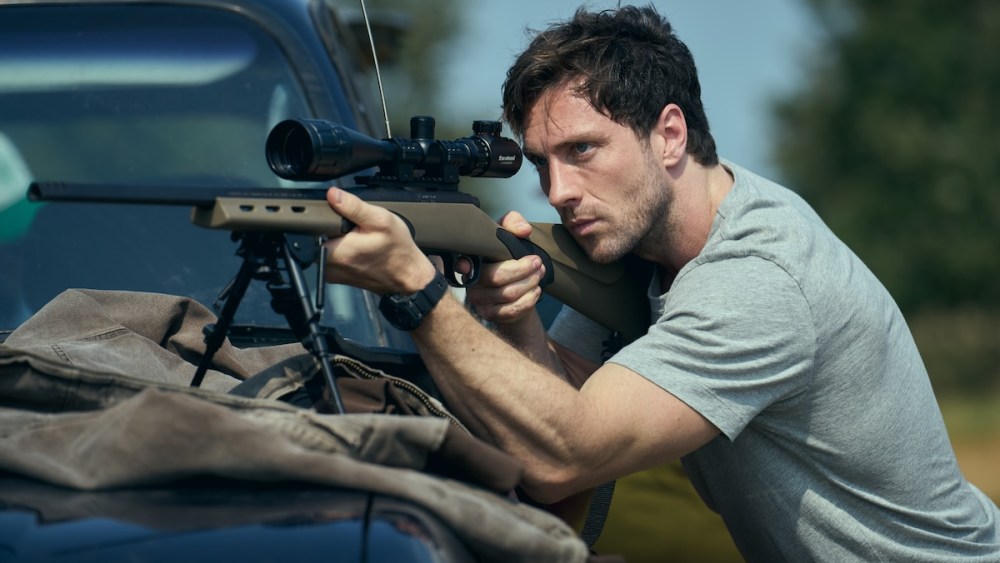What sets someone off? In the twisty, streaming-caliber thriller “Fuze,” that’s as much the question as whether the 500-pound bomb discovered in a London construction site might blow. If it does, the WW2-era explosive (presumably a relic of the Blitz) could wipe out several city blocks, which is why authorities swarm the area and evacuate all residents in the film’s opening minutes. Normally, that would be a recipe for some edge-of-your-seat action, although Ben Hopkins’ script makes clear early on that the bomb is just a distraction, while an even more sinister plot is ticking within the blast radius.
If it weren’t for the film’s cast (or the grim seriosity of its director, David Mackenzie), “Fuze” might have been a complete dud. But “Hell or High Water” helmer Mackenzie treats the assignment like he’s the one saving lives, eschewing anything that might count as fun along the way. With his jaw clenched and sights set on being the next James Bond, Aaron Taylor-Johnson plays Major Will Tranter, a bomb disposal pro who’s both an ace sniper and a bit of a loose cannon, breaking protocol in his obsessive attempt to deactivate the vintage ordnance with minimal casualties.
While Tranter’s poking around the deadly antique, a high-ranking police officer named Zuzana (Gugu Mbatha-Raw) is focused on protecting the public. Mackenize singles out a Dari-speaking immigrant named Rahim (Elham Ehsas) and his elderly parents as the residents warily pour out of a nearby apartment building, knowing that audiences’ imaginations (and biases) will start to suggest how this character might relate to the bigger picture. Although several of the film’s surprises are predictable — usually just moments before the reversal comes — no one is likely to figure out Rahim’s connection to the bomb.
One thing is sure: Movie stars don’t take roles in movies like “Fuze” unless they’re being offered something interesting to play, which means that the instant Theo James and Sam Worthington appear (or step from the shadows), our interest shifts from the bomb to whatever these two and their accomplices are up to. For nearly the first half of the film, composer Tony Doogan layers a steady synthetic heartbeat beneath the action, which gains little from this trick. If we’re invested, it’s because the cast telegraphs that these characters are important.
James’s character talks with a South African accent and goes by the name Karalis, and though he comes across as a villain at first, it’s too early to say if that’s true. Karalis supplies his colleagues with fluorescent orange utility uniforms and stealthily leads them through the back door of the Bank Al Muraqabah, located just below Rahim’s building. While Tranter tinkers and Zuzana monitors the wall of local surveillance footage, Karalis and his team get to work drilling through the wall of the vault. Clearly, it’s no coincidence that they picked this moment to rob the bank. But what is their greater goal?
Mackenzie’s a good director — good enough to make the sheer preposterous of this heist seem plausible — but he saves the thing that would make us root for these characters until the very end. Meanwhile, it’s not clear who’s side we’re meant to take, which complicates things once a scheme that couldn’t possibly have gone according to plan starts to unravel in unexpected and potentially upsetting ways. By this point, there are plot holes bigger than the one this bomb might tear in the London map.
How did the bomb get to the building site? Who’s the bloke whose safety deposit box Karalis is after, and why isn’t he a character? Is Zuzana the only one trying to stop the scheme, and what kind of thriller is that, where you leave it to the criminals to eliminate one another? There’s an element of sleek, Jean-Pierre Melville-style efficiency to the operation, if not Michael Mann-level theatrics. “Fuze” shares the French director’s code of honor between men, no matter which side of the law they inhabit, as seen in films such as “The Red Circle” and “Army of Shadows.”
Apart from one shocking death (when Tranter switches from neutralizing bombs up close to eliminating threats with his long-range rifle), the action is entertaining enough in the moment, but not especially memorable. The most explosive scene isn’t the one you expect, but the coda in which we learn why three characters are so unwaveringly loyal, when everyone else seems ready to double-cross each other at the first opportunity. It’s in that moment that the film’s fuze is set. Can Tranter or anyone stop it?

